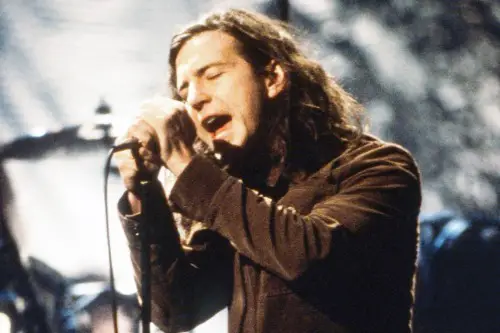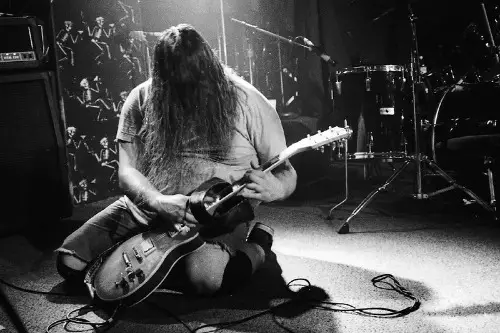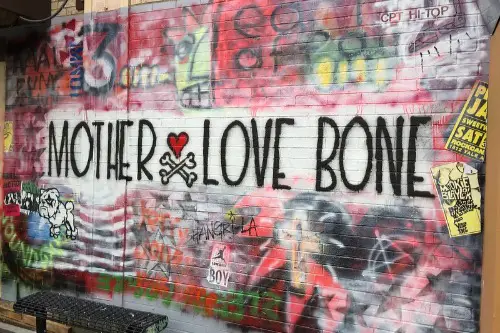1. Nirvana

It’s hard to imagine Nirvana as anything but a global phenomenon, but their rise wasn’t immediate. Their debut album Bleach sold modestly on Sub Pop, and they were scraping by with small club gigs. When they signed to DGC Records, there was no guarantee that Nevermind would take off. In fact, label expectations were modest at best.
But when “Smells Like Teen Spirit” exploded, Nirvana suddenly became the face of grunge worldwide. Their mix of raw angst, catchy hooks, and Kurt Cobain’s authenticity turned them into icons. Even today, their story resonates because they weren’t crafted for mainstream appeal—they stumbled into it. That underdog quality is part of why their legacy feels so real.
2. Pearl Jam

Pearl Jam almost didn’t survive their own early success. Their debut album Ten was slow to climb the charts, and it took nearly a year for the band to break through. Critics at first weren’t sure what to make of their classic rock leanings mixed with grunge aesthetics. And Eddie Vedder, shy and intense, wasn’t the typical frontman labels expected to headline arenas.
Eventually, their perseverance paid off, and songs like “Alive” and “Jeremy” became generational anthems. What made them iconic was their resistance to fame—they famously battled Ticketmaster to keep shows affordable. That anti-corporate stance made them more than a band; it made them a movement. Even with a rocky start, they defined integrity in grunge.
3. Soundgarden

Before Soundgarden broke into the mainstream, they spent years building credibility in Seattle’s underground scene. Early records on SST and Sub Pop were heavy and abrasive, leaning more toward metal than radio-friendly rock. Critics liked them, but mainstream audiences weren’t sure what to do with their sound. For a while, they seemed destined to remain a cult band.
That all changed with Badmotorfinger and later Superunknown. Chris Cornell’s soaring voice and the band’s intricate riffs stood out in a crowded scene. Their refusal to water down their heaviness made their eventual success even sweeter. Today, Soundgarden represents the artistic depth of grunge, proving the genre wasn’t just three chords and angst.
4. Alice in Chains

Alice in Chains nearly got lost in the shuffle because their sound leaned heavily toward metal. Early on, they struggled to fit neatly into the “grunge” category, which was more aligned with punk and alternative vibes. Their bleak, haunting lyrics about addiction and despair didn’t exactly scream radio hit. For a while, they were overshadowed by more straightforward rock acts.
But Dirt turned that around, cementing them as masters of dark, brooding songs that resonated deeply with fans. Layne Staley’s voice gave their music an unforgettable emotional punch. What made them iconic was their unflinching honesty about pain and struggle. In hindsight, that rawness became their greatest strength.
5. Mudhoney

Mudhoney were the scrappy kids of the Seattle scene, and in many ways, they never fully “made it” commercially. Their debut single “Touch Me I’m Sick” was noisy, unpolished, and almost a parody of rock bravado. Major labels didn’t know what to do with them, and they never chased mainstream success. For a time, it looked like they’d be forgotten outside of Seattle.
Instead, Mudhoney became legends for helping define grunge’s messy, chaotic spirit. They embodied the attitude more than the fame, showing what grunge was before the big labels swooped in. Bands like Nirvana even credited Mudhoney as a key influence. That enduring credibility has made them iconic in their own right.
6. Screaming Trees

Screaming Trees spent years teetering on the edge of breaking through but never quite did. They signed to major labels, but their albums didn’t get the push they needed. Mark Lanegan’s deep, haunting vocals gave them a unique sound, but radio largely passed them by. For much of their career, they seemed stuck in limbo.
Yet their song “Nearly Lost You” became a cult hit, immortalized on the Singles soundtrack. Even without massive sales, their blend of psychedelia and grunge earned them devoted fans. Lanegan’s later solo career only underscored how powerful his presence was. The Trees may have been underrated, but they remain an essential chapter of grunge history.
7. L7

Though often lumped into punk and alternative, L7 were very much part of grunge’s DNA. Their early records were raw and uncompromising, and mainstream acceptance seemed unlikely. For years, they toured tirelessly without much recognition. Their unapologetically feminist attitude made them outliers in a male-dominated scene.
Then came Bricks Are Heavy, with its infectious hit “Pretend We’re Dead.” Suddenly, L7 were everywhere, showing that grunge could be political, fun, and furious all at once. They challenged stereotypes about what a grunge band could look and sound like. That defiance is what makes them unforgettable today.
8. Stone Temple Pilots

Stone Temple Pilots were initially written off as Nirvana and Pearl Jam copycats. Critics accused them of being derivative, and their credibility was constantly questioned. Their debut, Core, sold well, but many wondered if it was just riding the grunge wave. For a moment, it looked like they wouldn’t last.
But their evolution proved the doubters wrong. With albums like Purple, they showed they could write distinctive, innovative rock songs. Scott Weiland’s charisma made them one of the most compelling live acts of the era. Over time, they’ve been reappraised as one of the genre’s most versatile bands.
9. Hole

Courtney Love’s band, Hole, always existed under a cloud of controversy. Early on, their abrasive sound and confrontational image made labels hesitant. With grunge already male-dominated, a woman leading a band with that much fury was almost unheard of. It took years for them to break into the mainstream.
That breakthrough came with Live Through This, which arrived just days after Kurt Cobain’s death. Despite the tragic timing, the album was hailed as a feminist grunge masterpiece. Songs like “Violet” and “Doll Parts” proved Love could channel rage and vulnerability in equal measure. Hole became iconic because they broke barriers in a scene that often left women out.
10. Smashing Pumpkins

Though often associated with alt-rock, Smashing Pumpkins emerged from the same scene and ethos as grunge. Early on, their layered guitar sound didn’t quite fit Seattle’s stripped-down aesthetic. Critics weren’t sure if they belonged, and their debut, Gish, had modest success. It wasn’t clear if they’d ever reach a larger audience.
Then Siamese Dream and Mellon Collie and the Infinite Sadness made them undeniable. Billy Corgan’s ambition pushed the genre into new, expansive territory. Their willingness to go big—sonically and visually—helped redefine what grunge could be. They may have been outsiders at first, but their influence is impossible to overlook.
11. Melvins

The Melvins were pioneers, but they never aimed for stardom. Their sludgy, slow riffs were a blueprint for grunge, though at the time they seemed too strange for mass appeal. Years passed with them as underground heroes, largely ignored by mainstream audiences. For a while, they seemed destined to remain cult icons only.
But their influence was massive—Kurt Cobain himself was a huge fan, and even worked as a Melvins roadie. They showed an entire generation that heaviness could be experimental and weird. Though they never sold millions, their fingerprints are all over grunge history. That’s what keeps their name revered today.
12. Mother Love Bone

Mother Love Bone could have been massive, but tragedy cut their rise short. Their mix of glam and grunge set them apart in the late ‘80s Seattle scene. Just as they were poised for success, frontman Andrew Wood died of an overdose. The band’s momentum evaporated overnight.
Yet their legacy lived on through Pearl Jam, which rose from their ashes. Songs like “Chloe Dancer/Crown of Thorns” remain some of grunge’s most heartfelt moments. Wood’s charisma made people believe they were witnessing the next great rock band. Their short-lived story cemented them as legends of what could have been.
This post 12 Grunge Bands That Almost Didn’t Make It Big—And Why They’re Still Iconic was first published on American Charm.


